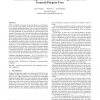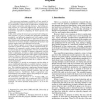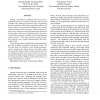1024 search results - page 26 / 205 » Complexity and Performance in Parallel Programming Languages |
123
click to vote
ASPLOS
2006
ACM
15 years 8 months ago
2006
ACM
GPUs are difficult to program for general-purpose uses. Programmers can either learn graphics APIs and convert their applications to use graphics pipeline operations or they can ...
234
click to vote
MICRO
2006
IEEE
15 years 2 months ago
2006
IEEE
Since processor performance scalability will now mostly be achieved through thread-level parallelism, there is a strong incentive to parallelize a broad range of applications, inc...
EUROPAR
2003
Springer
15 years 7 months ago
2003
Springer
Parallel programming is seen as an effective technique to improve the performance of computationally-intensive programs. This is done at the cost of increasing the complexity of t...
122
click to vote
ICLP
1997
Springer
15 years 6 months ago
1997
Springer
We introduce novel, sound, complete, and locally optimal evaluation strategies for functional logic programming languages. Our strategies combine, in a non-trivial way, two landma...
125
Voted
IPPS
2002
IEEE
15 years 7 months ago
2002
IEEE
Tabling or memoing is a technique where one stores intermediate answers to a problem so that they can be reused in further calls. Tabling is of interest to logic programming becau...



